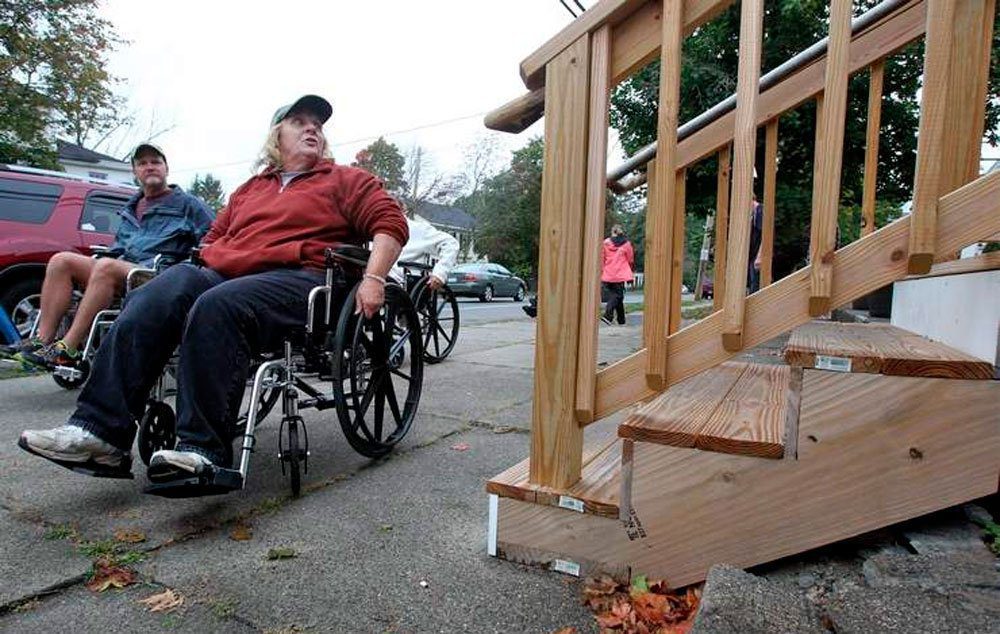LANCASTER — Eighteen years ago, Rose-Marie Bissonnette was in a horrific car accident that changed her world. She lost her leg below the knee and was in therapy for various injuries for months.
Ms. Bissonnette was in a wheelchair when she needed to go for hand therapy.
“I asked if the place I was referred to was handicapped-accessible. They said yes. I asked if there were any steps. They said there was one step (to get into the therapy center after the ramp). Well, guess what, one step is too many when you are in a wheelchair. Until this happened to me, I just did not know how many barriers there are for people who have to use wheelchairs, walkers, canes,” she said.
Lancaster’s Commission on Disability kicked off its October Is Disability Awareness month on the town green with displays, information and an awareness walk around the center of town with town officials and residents.
20 States on Wheels, a team of Harvard University students who drove cross-country to discover what accessibility for disabled tourists was like, could not join them because of an email threat to several hundred Harvard students on Friday.
In a telephone interview, Brad Riew and Kunho Kim talked about their trip, what they did and the results of their survey.
“I’ve always wanted to go on a road trip,” said Mr. Kim, who uses a wheelchairsince a skiing accident four years ago. He drove the van along with team member Cynthia Cheung. They visited major tourist attractions from viewpoints of the Golden Gate Bridge in San Francisco, the St. Louis Arch and the Lincoln Memorial in Washington, D.C., and rated hotels and restaurants for handicapped access. They say most places paid meticulous attention to detail for access, with notable exceptions in booking hotel rooms with handicapped access.
To see and read about the team’s summer cross-country odyssey: http://wheelproject2014.wordpress.com.
Three selectmen, a firefighter, a resident, the Council on Aging van driver and Michael McCue, chairman of the Commission on Disability, took a shorter, half-mile trek around town center in wheelchairs on Saturday.
Along the way, they encountered cracked and uneven sidewalks that were were difficult to travel and cars parked on the sidewalks, passed two stores that were inaccessible to wheelchairs, and discovered how tiring wheeling a wheelchair can be.
“I really have a much deeper appreciation now of what people have to go through. Uphill is hard, that little inch and a half on that sidewalk was very hard to get over, when I went sideways into the grass it was like going through snow,” said Selectman Stanley B. Starr Jr.
Selectman Susan E. Smiley said, “This was tough, a workout. We’re always in such a rush to get somewhere, I think we have no idea what folks in wheelchairs have to do to get around.”
Lesley Allison is a commission member and a physical therapist who teaches people how to use a wheelchair as part of her job.
“It takes a tremendous amount of arm strength. Surfaces are huge challenges. Some people can pop up over a curb, but that takes a special kind of chair and years of experience. The grade, pitch, surface and what’s on the surface can affect you, even wet leaves on a sidewalk,” said Ms. Allison, who coached the first-time wheelchair users and even gave them a break by pushing them when the going got a little tough.
Mr. McCue said that the town center is probably the most accessible place in Lancaster.
“It doesn’t get any better than this, but the challenges are still there. I’ve always had a place in my heart and mind for people with disabilities. After three years on the commission and learning what those challenges are, to say that it was an eye-opener for me is an understatement.”
According to Mr. McCue, statistics say that 10 percent of the town’s residents have a disability of some kind. The commission decided to have a monthlong awareness month to not only show town officials what conditions in town are like, but also to reach out to residents who may need help.
“My biggest issue is that people who have disabilities are lacking information on what’s available to them, what the laws are, and how they can get assistance. All of that information is on our Web page on the town website,” said Ms. Bissonnette.
Source: Telegram




Enviado via iPad